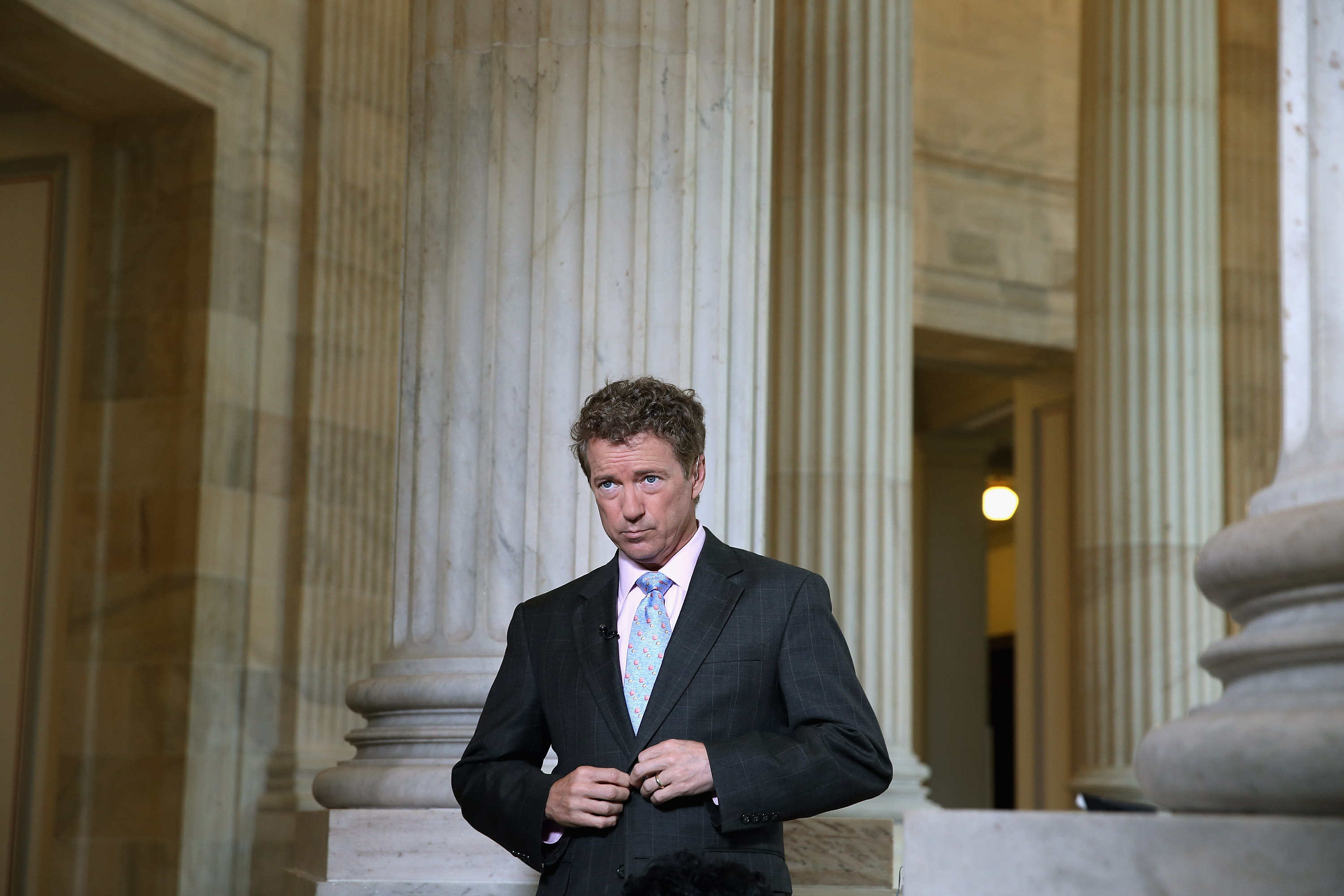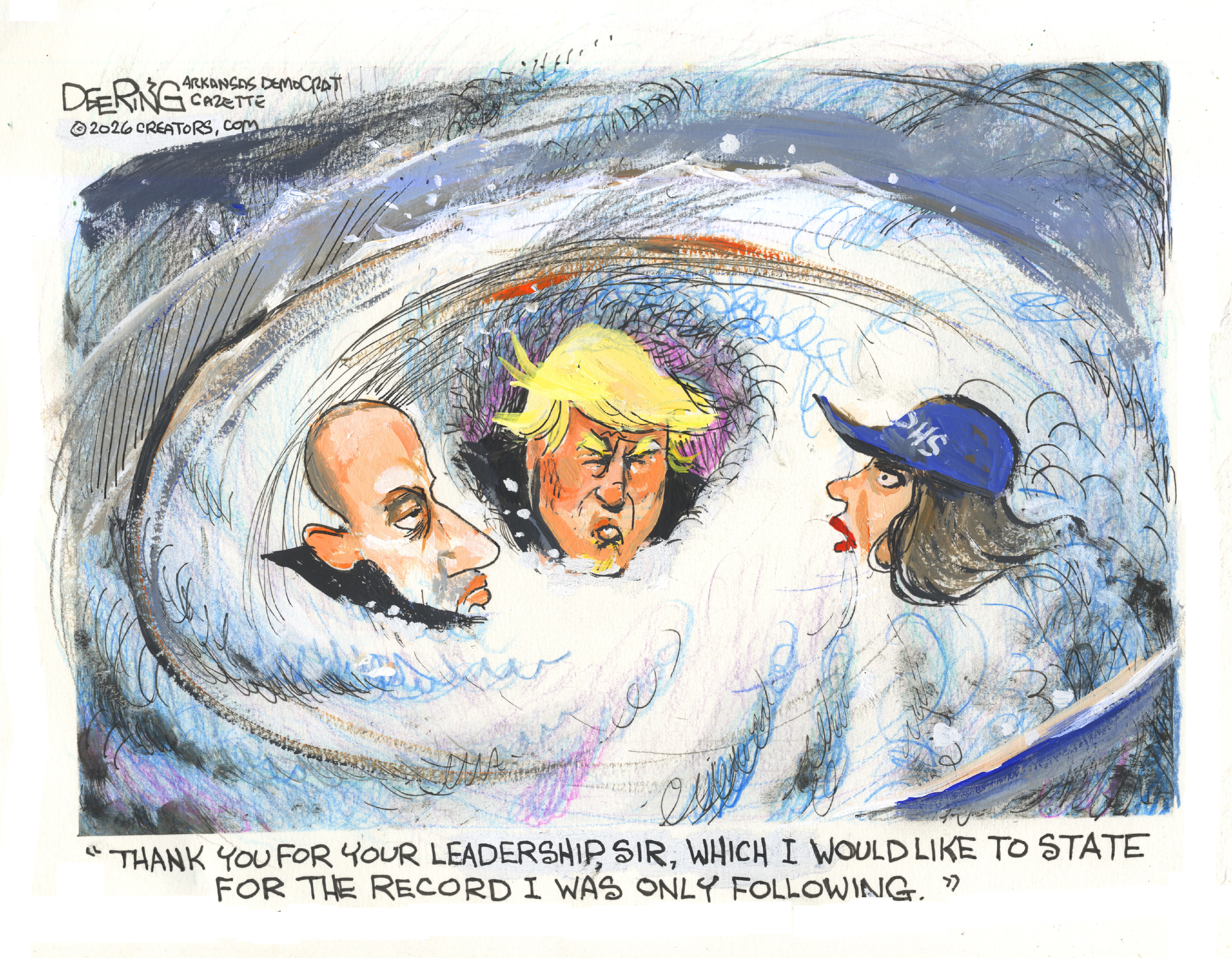How Donald Trump redeemed Rand Paul
A series of humiliations have transformed the Kentucky senator


A free daily email with the biggest news stories of the day – and the best features from TheWeek.com
You are now subscribed
Your newsletter sign-up was successful
The last debate before the Iowa caucuses was like entering alternate reality without Trump. It was a world in which Rand Paul seemed a far more compelling and larger figure in this race than he had been until now. The Donald's absence opened up the role of dissenter and truth-teller, and Rand Paul stepped in brilliantly. It was a reminder that there was another voice insisting that party orthodoxy may have to open up. And it was a newly chastened voice.
That Donald Trump had nearly crippled Jeb Bush, we all knew. Trump said that Bush's campaign logo "Jeb!", previously considered an attempt to be his own man, reflected Jeb's shame in his family name. Calling him low-energy seemingly evoked the way that Jeb's WASP elite has become infirm as it retreated from New York City to Connecticut, Texas, or Florida. Trump even refused to apologize for insulting Jeb's wife.
But Trump has done something else to Paul. Trump has called him "lowly" and "truly weird." Trump began a debate asking why the hell Paul was allowed on the stage. But probably more grave to the Paul campaign, he took Paul's issues. Paul was going to be the most dovish voice on the stage, the one critical of useless wars in the Middle East. Trump became that voice instead, leaving Rand Paul to talk about debt as a national security issue. Eventually Paul was pushed off stage altogether.
The Week
Escape your echo chamber. Get the facts behind the news, plus analysis from multiple perspectives.

Sign up for The Week's Free Newsletters
From our morning news briefing to a weekly Good News Newsletter, get the best of The Week delivered directly to your inbox.
From our morning news briefing to a weekly Good News Newsletter, get the best of The Week delivered directly to your inbox.
This series of humiliations seems to have transformed Paul.
In 2010, the eye doctor turned into a United States senator in the space of a few months. He shared many of his libertarian father's very specific policy ideas, but he shared them from a much more accessible persona. And in some ways he was happy to bridge the gap between the stern Austrian School-libertarianism of Ron Paul and the more conventional Republican Party. So he moderated. Instead of agitating to abolish the Federal Reserve, why not ask for some oversight? Instead of a foreign policy that amounts to a simple protest of the federal government itself, why not just be more careful in picking our battles?
Paul was supposed to be the most interesting man in politics. He had a plausible idea of how to transition the party from the failure of the Bush-era to the oncoming future, where the children of today's Republicans are more libertarian on gay marriage and more attuned to inequality, either of income or status before the organs of the American state.
Unfortunately, Paul's political style sometimes comes across as slightly entitled. He understands himself as a conviction-politician, and can sometimes be baffled when activists and voters fail to understand or share his strategy. He seems to lecture Republicans in a way that can come across as condescending, as if to emphasize that if they really believed in small government, then of course they owed him, and his policy views, their support. No one likes to be told what they ought to believe and do in this way. Sometimes, in his effort to reach out to audiences beyond the usual Republican tent party, he seemed to want credit for just showing up, as when he went to Howard University and explained what students there already knew — that their grandparents and great grandparents were more likely to be Republicans.
A free daily email with the biggest news stories of the day – and the best features from TheWeek.com
Last week's Paul was more relaxed, maybe even slightly resigned. Instead of telling the audience or the other aspirants what they ought to believe, he shared his own convictions as his own. He gave fine answers on his views about abortion; he'll restrict it in whatever way he can. But he acknowledged that Washington cannot create a more virtuous American people by fiat. He shared his views about criminal justice reform in a way that is far more attractive than his recitations of the politics of the 1960s to a college audience.
The Republican Party will have much to reckon with after this presidential election cycle. The party has almost never been stronger on local and state levels, but it seems to have a problem assembling a presidential coalition. That will be true no matter who the party nominates.
But Trump has given a few gifts to the Republican Party, if they care to notice. First, he revealed a populist class of voters encamped along the edge of the GOP's big tent. That is something the political class will have to reckon with for years. And he has given us a humbler, wiser Rand Paul, a man who was already set on transforming the GOP into something larger and more responsive than it had been.
Michael Brendan Dougherty is senior correspondent at TheWeek.com. He is the founder and editor of The Slurve, a newsletter about baseball. His work has appeared in The New York Times Magazine, ESPN Magazine, Slate and The American Conservative.
-
 6 gorgeous homes in warm climes
6 gorgeous homes in warm climesFeature Featuring a Spanish Revival in Tucson and Richard Neutra-designed modernist home in Los Angeles
-
 Russia’s ‘cyborg’ spy pigeons
Russia’s ‘cyborg’ spy pigeonsUnder the Radar Moscow neurotech company with Kremlin-linked funding claims to implant neural chips in birds’ brains to control their flight, and create ‘bio-drones’
-
 Political cartoons for February 8
Political cartoons for February 8Cartoons Sunday’s political cartoons include going down the drain, American history, and more
-
 The billionaires’ wealth tax: a catastrophe for California?
The billionaires’ wealth tax: a catastrophe for California?Talking Point Peter Thiel and Larry Page preparing to change state residency
-
 Bari Weiss’ ‘60 Minutes’ scandal is about more than one report
Bari Weiss’ ‘60 Minutes’ scandal is about more than one reportIN THE SPOTLIGHT By blocking an approved segment on a controversial prison holding US deportees in El Salvador, the editor-in-chief of CBS News has become the main story
-
 Has Zohran Mamdani shown the Democrats how to win again?
Has Zohran Mamdani shown the Democrats how to win again?Today’s Big Question New York City mayoral election touted as victory for left-wing populists but moderate centrist wins elsewhere present more complex path for Democratic Party
-
 Millions turn out for anti-Trump ‘No Kings’ rallies
Millions turn out for anti-Trump ‘No Kings’ ralliesSpeed Read An estimated 7 million people participated, 2 million more than at the first ‘No Kings’ protest in June
-
 Ghislaine Maxwell: angling for a Trump pardon
Ghislaine Maxwell: angling for a Trump pardonTalking Point Convicted sex trafficker's testimony could shed new light on president's links to Jeffrey Epstein
-
 The last words and final moments of 40 presidents
The last words and final moments of 40 presidentsThe Explainer Some are eloquent quotes worthy of the holders of the highest office in the nation, and others... aren't
-
 The JFK files: the truth at last?
The JFK files: the truth at last?In The Spotlight More than 64,000 previously classified documents relating the 1963 assassination of John F. Kennedy have been released by the Trump administration
-
 'Seriously, not literally': how should the world take Donald Trump?
'Seriously, not literally': how should the world take Donald Trump?Today's big question White House rhetoric and reality look likely to become increasingly blurred
